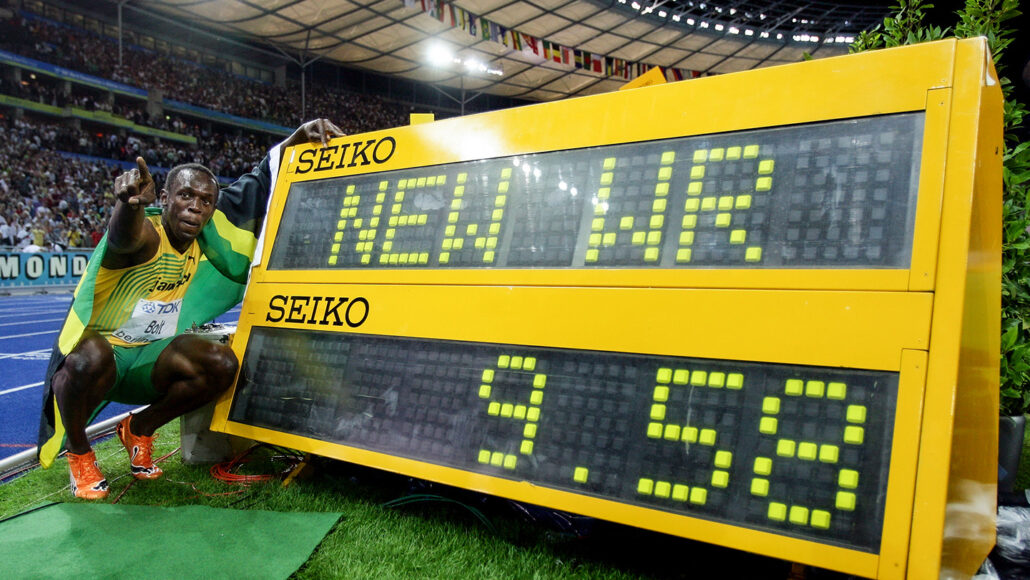How much more can Olympic speed records fall?
Humans are built to go faster than current world speed records, science suggests

Usain Bolt of Jamaica set the world record for the men’s 100-meter sprint on August 16, 2009. He achieved this feat at the 12th IAAF World Athletics Championships in Berlin, running the race in 9.58 seconds.
Mark Dadswell/Getty Images Sport/Getty Images Europe
Ready, set — go break a record!
As elite athletes compete in the 2024 Summer Olympics in Paris, they’ll likely break at least a few world records. But no one has set a new record in more than a decade for two of the Olympics’ fastest events — the 100-meter dash and the 50-meter freestyle swim. The plateau in top speed for these races raises a curious question. Just how much faster can humans move on land or through the water?
The 100-meter dash is a sprint to the finish. Usain Bolt of Jamaica set the current men’s record in 2009. He ran it in just 9.58 seconds, with a top speed of nearly 45 kilometers (28 miles) per hour. American sprinter Florence Griffith Joyner set the women’s record for this race in 1988. She ran it in 10.49 seconds.
Human gait and muscle strength could let people go faster. Research suggests that people might be able to run as fast as roughly 60 kilometers (37 miles) per hour. That’s 100 meters in 5.625 seconds. But sprinting speed largely depends on technique, says Ross Miller. He studies biomechanics at the University of Maryland in College Park.
“A sprint should be ‘as hard as you can’ every step,” Miller says. Top speed depends on how little time our feet touch the ground while still applying the force necessary to propel us forward.
Maybe no one has yet run at top human speed because no one has come along with the physical ability, Miller says. Or maybe the right person hasn’t had access to the training. It’s also possible, he notes, that the right person with the right training simply hasn’t “put it all together yet in the perfect race.” In the past century, the fastest time for the 100-meter dash has shrunk in women by about three seconds. In men, it dropped by only one second.
Swifter runs
Record times for the 100-meter dash have gone down by about a second for men since recordkeeping began in 1912. Women are running the race about three seconds faster since the first record was set in 1922. Florence Griffith Joyner is the current women’s record holder, but that record is in doubt. (Winds over 2 meters per second disqualify new records. The wind gauge registered 0, but other races that day had logged winds. Still, the record stands.)
Starting in 1968, some record times were oddly higher than earlier ones. That happened because of a transition to electronic timing. The new timers were precise to a hundredth of a second. Previous manual times were rounded to the nearest tenth of a second.
It’s much harder for humans to go fast in water. The men’s record for the 50-meter freestyle belongs to César Cielo Filho. This Brazilian athlete swam 50 meters in 20.91 seconds in 2009. That was about four times slower than Bolt’s record-setting average running speed. In 2023, Swedish swimmer Sarah Sjöström earned the women’s record for 50-meter freestyle by swimming the race in 23.61 seconds.
Both top times are roughly three seconds faster than the first records set in the 1970s.
Swimming is slower than running largely because water is far denser than air, explains Timothy Wei. He studies fluid dynamics at Northwestern University in Evanston, Ill. But also, “we all have this bowling ball between our shoulders,” Wei says. (He’s talking about the head.) “This thing creates a huge amount of drag.”
Faster swims
World-record times for men and women swimming the 50-meter freestyle have gone down by about three seconds since recordkeeping began in the late 1970s. A wave of new records came in 2008 and 2009. At that time, a new swimsuit line manufactured by Speedo entered pools. The expensive fabric compressed swimmers’ bodies and also made them more buoyant. That gave swimmers who wore these suits a speed advantage. In 2010, those suits were banned from competition.
No one knows just how much faster swimmers can get. But swimming with the body parallel to the water’s surface can help reduce drag. Superfast freestyle swimmers also raise their elbows as high as possible above the water. Then, they plunge their arms close to straight down into the water to pull themselves forward.
“If you get your technique right, and you can get your stroke rate as high as possible,” Wei says, “that combination is what’s going to get you to go as fast as you can.”







